Quality Improvement of Health Services through 5S-KAIZEN-TQM approach
Hospitals play a vital role in the health systems in providing health service to the population. Hospitals are often the first point of contact by patients for diagnosis and care and a designation for patients to receive specialized and inpatient care. Despite their key roles in the health systems and despite the fact that significant portion of national health expenditure is spent on hospitals, performance of hospitals have been neglected in the global development discourse, with more attention being paid to strengthening of primary health care as well as to disease specific programs. As large share of health expenditure is disbursed to hospitals, hospital management, focusing on efficiency and quality of their services, needs to be addressed to strengthen the country's health systems as a whole and to promote universal health coverage under resource constraints.
5S-KAIZEN-TQM is a simple, yet highly effective approach to improve quality of healthcare and hospital management in resource constrained settings. 5S and KAIZEN approach originated from the manufacturing industry in Japan such as the TOYOTA Motor Corporation. 5S stands for Sort, Set, Shine, Standardize, and Sustain, and 5S activities lead to cleaner and more efficient work environment. KAIZEN, which means "change for the better" in Japanese, is a team-based continuous problem solving activity to improve work process for increased productivity, quality and safety. TQM is a state in which KAIZEN activities are continuously being implemented in all departments and the leaders are able to make evidence based decisions based on such activities, optimizing the organization's management. As health services are produced from complex inputs and processes similar to the manufacturing industry, 5S and KAIZEN can also be applied to the healthcare settings.
Application of 5S-KAIZEN approach to healthcare setting was initiated by Dr. Karandagoda, who was the director of Castle Street Hospital for Women in Sri Lanka. He independently learnt about 5S, KAIZEN and TQM and introduced these approaches to his hospital in a stepwise manner, from 5S to KAIZEN and finally aiming for TQM. As a result, dramatic change such as decrease in nosocomial infection and improvement of employees' motivation was observed. Observing the impressive change in the Castle Street Hospital for Women, JICA decided to support the introduction of 5S-KAIZEN-TQM approach to public hospitals in 15 countries in Africa in 2007. One pilot hospital was selected from each country, and trainings in Japan and in Sri Lanka followed by on-site consultation visits were provided. Afterwards, in some countries such as Tanzania, bilateral technical cooperation projects were initiated to support the government effort in promoting the approach. Through such efforts and spontaneous dissemination, 5S-KAIZEN activities have expanded to at least 500 health facilities in 22 countries.
The 5S-KAIZEN-TQM approach was awarded as one of the finalists of DAC award in 2015 for its innovative approach and its scalability. JICA continues to support partner countries in improving quality of healthcare and efficiency through application of the 5S-KAIZEN-TQM approach.
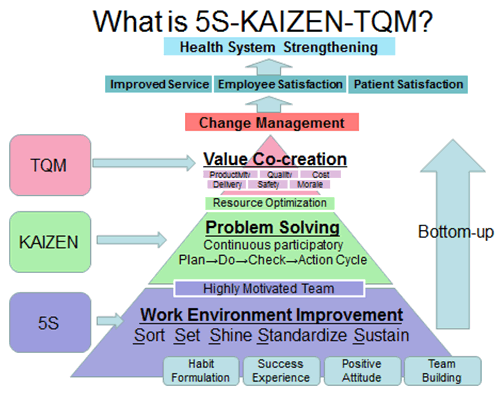
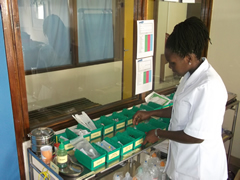
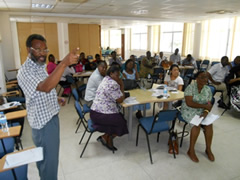
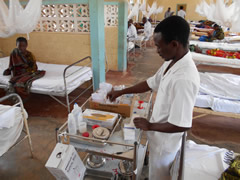
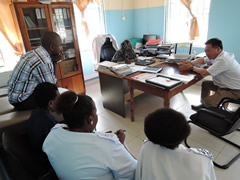




scroll